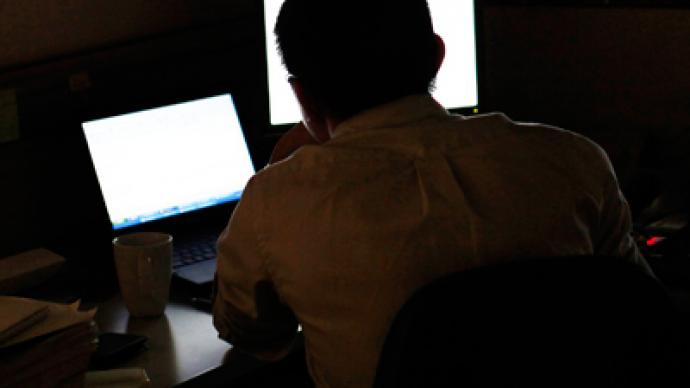'Stop Cyber Spying Week' aims to eradicate CISPA

Americans who don’t file their taxes or an extension this week will be left waiting for the IRS to come knocking at their door, but is that the biggest threat the government poses right now? Some watchdog groups warn: not at all.
Opponents of online censorship bills being considered by Congress under the guise of the nation’s cybersecurity concerns are re-launching a counter-campaign this week. Advocates fighting for an open Internet are concerned about how the federal government is attempting to once again restrict access to the Web for millions of Americans, and once again are waging a war on the lawmakers looking to extinguish the freedom of information.Only four months after a massive campaign to crush SOPA — the Stop Online Piracy Act — ended in the bill’s collapse, activists are once again taking their “Leave our Internet alone” message to the Web. The US Congress is expected to have a vote regarding SOPA’s top-secret cousin next week — the Cyber Intelligence Sharing & Protection Act of 2011, or CISPA — and if its opponents have anything to do with it, this bill will be brought to a crushing defeat thanks to angry Web users ready to fight for their rights to surf.“CISPA … would allow companies to monitor private email, Internet searches, and other online activity and then shareinformation with the government under an excessively broad definition of a cyber threat,” cautions the DC-based Center for Democracy & Technology (DCT). “Under CIPSA, the government could do almost anything with this information, including using it for purposes not related to cybersecurity. The information could go directly to the National Security Agency, a military agency that operates secretly and with little public accountability.”Sound spooky? It’s certainly not sci-fi and some are worried CISPA could become a reality soon. Under the bill, the government can dig into and share any information "directly pertaining to a vulnerability of, or threat to" a computer network, but what constitutes those attacks is really open ended. “The broad base of support for this bill shows that Congress recognizes the urgent need to help our private sector better defend itself from these invidious attacks," US Rep Mike Rogers (R-Michigan) said in submitting the bill to Congress.Unlike SOPA, though, CISPA has yet to garner the type of attention that was instrumental in killing that bill before Congress could approve it. Additionally, Gannett News reports that both Facebook and Microsoft are on the list of around 30 companies that are pushing to get CISPA approved. All that support could crumble this week though — at least if everything goes as planned for those behind the Stop Cyber Spying Week, which kicked off on Monday.“The goal of Stop Cyber Spying Week is simple: get Congress to back off of any cybersnooping legislation that sacrifices the civil liberties of Internet users,” explains the Electronic Frontier Foundation (EFF) in a press release published on Monday, April 16.Along with the support of the CDT other opponents of so-called “cyber spy” legislation, the EFF is attempting to raise awareness this week about the sequel to SOPA that was snuck into Congress by American lawmakers earlier this year. The groups have thus decided to come together this week to launch a campaign that they hope will emulate the success of the massive Internet blackout earlier this year supported by Wikipedia, Reddit and other major websites and was instrumental at ending SOPA and its sister-legislation, the Protect IP Act (PIPA), dead in its tracks.“Every day, we all spend more and more of our lives online and share more and more of our most sensitive information. Keeping our computer systems secure is a real concern, but CISPA is absolutely the wrong answer,” Mandy Simon writes on behalf of the American Civil Liberties Union. Speaking to RT last month, Kendall Burman of the CDT commented that some of those concerns are as real as Congress might, at times, make it seem. “Cyber security, when done right and done narrowly, could benefit everyone,” Burman explained. “But it needs to be done in an incremental way with an arrow approach, and the heavy hand that lawmakers are taking with these current bills . . . it brings real serious concerns.”And as the ACLU see it, the government can dig into our personal correspondence if it really wants to—and they are willing to help.“So the government wants our information. Let's give it to them,” writes Simon, “Tweet a message to your member of Congress on Twitter about the kind of things you do online that are none of the government business. Tell your Congressperson the details of what you do online — the personal, the mundane, whatever — so they can see just how much personal, unnecessary data about you could be shared with the government as a result of the legislation's dangerously vague language. Use the hashtags #CongressTMI and #CISPA.”“Our goal this week is to show exactly how invasive CISPA's power would be and we encourage all of you to get involved. Please stand with us, tweet with us and tell your Representatives that if cybersecurity legislation doesn't protect your rights, it shouldn't get passed,” adds Simon.












